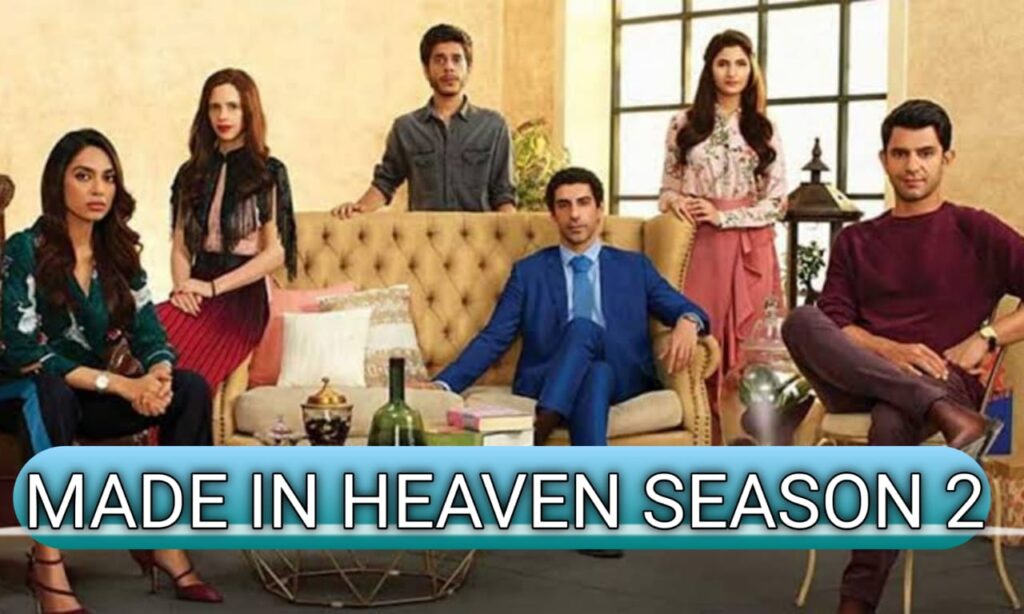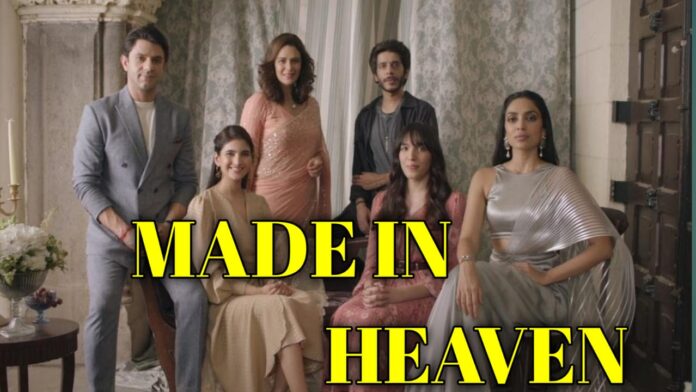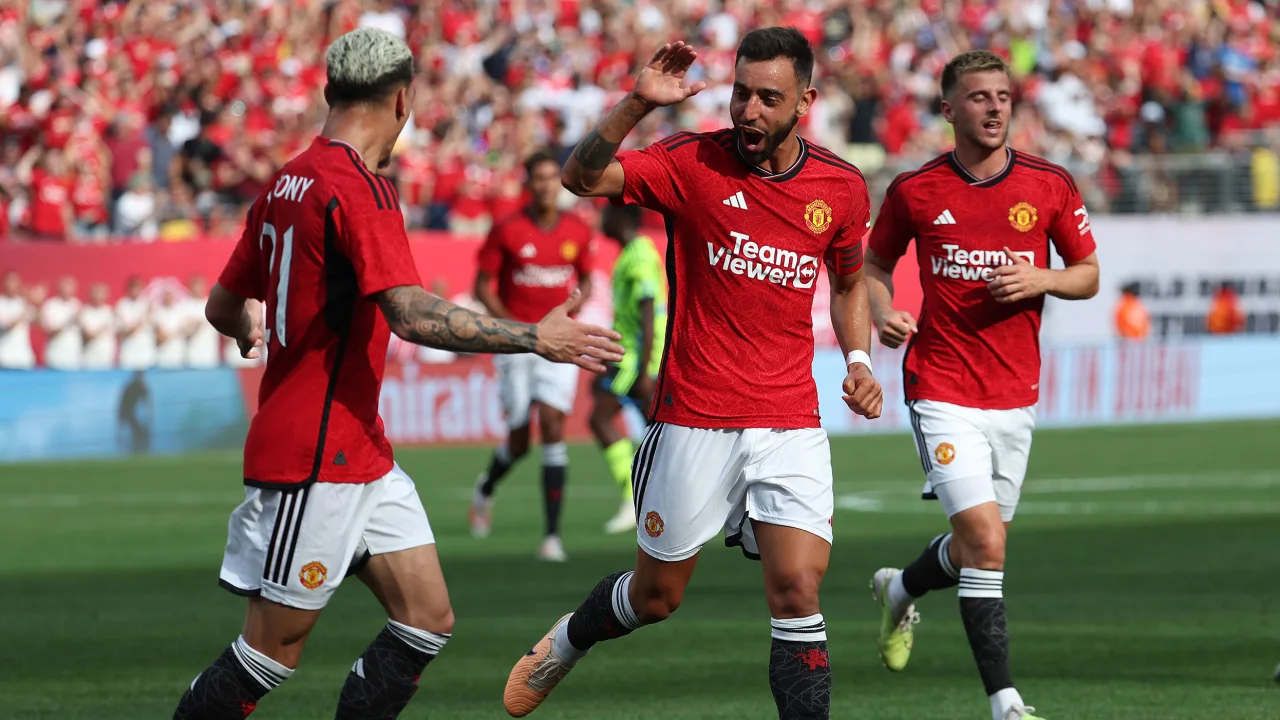“Review of ‘Made in Heaven’ Season 2 Series: A Blend of Pride, Progressiveness, and Occasional Drifting
In the world of lavish Indian weddings, brought to life by Zoya Akhtar and Reema Kagti, the second season of ‘Made in Heaven’ maintains its knack for delivering thought-provoking societal insights, while occasionally meandering off track.”
“Much like the delightful finale treats of paan and sweetmeats at the conclusion of a lavish wedding in Delhi, each episode of ‘Made in Heaven’ has its own special touch – the closing voiceovers. I’m talking about those introspective recaps delivered by Shashank Arora’s dreamy videographer. About an hour into the new season, he chimes in with a contemplative tone, “A somber fairy tale continues to linger in the heart of Delhi,” almost like that candid friend who suddenly reappears on social media. Around the halfway mark, he adds, “I’ve never really believed that marriages are made in heaven.” These musings might be a bit heavy-handed and obvious, but they serve as a helpful tool, a quick refresher on the episode’s essence, in case you’ve lost track of its narrative.”
“Debuting in 2019 and crafted by the collaborative minds of Zoya Akhtar and Reema Kagti (with the talented writer-director Alankrita Shrivastava as a consistent force), the inaugural season of ‘Made in Heaven’ stood as a witty commentary on the class divisions in Delhi. Weaved around the journeys of two ambitious wedding planners, it artfully peeled away the layers of conservatism and uniformity entrenched within India’s corporate upper echelons. The season concluded with Tara (played by Sobhita Dhulipala) and Karan (portrayed by Arjun Mathur) in a predicament, their lavish ‘Made in Heaven’ agency office reduced to ruins and vandalized by extremist factions. In the second season, we reconnect with Tara and Karan six months later, with Jauhari-ji (Vijay Raaz), now an integral partner in their venture, helping them get back on their feet. Mona Singh joins the ensemble as a pragmatic auditor, doubling as Jauhari’s wife, and infuses a wonderfully chaotic and lively energy into the initial episodes. “You ordered three large burgers?” she playfully teases Jaspreet aka Jazz (Shivani Raghuvanshi). “And fries too?”

“Made in Heaven Season 2 TIME PERIOD
Creators: Zoya Akhtar and Reema Kagti
Cast: Sobhita Dhulipala, Arjun Mathur, Jim Sarbh, Kalki Koechlin, Shashank Arora, Shivani Raghuvanshi, Mona Singh, Vijay Raaz
Episodes: 7
Run-time: 60-75 minutes
Plot: Delhi-based wedding planners Tara and Karan resurrect their ‘Made in Heaven’ agency while navigating through new and more challenging social dilemmas.
As Tara and Karan land some major clients and start regaining their foothold in the business, their personal lives throw them for a loop. Karan, grappling with past wounds regarding his sexuality, finds himself emotionally manipulated by his mother, who is both homophobic and battling cancer while refusing chemotherapy. This sends him spiraling, driving him into betting, obligation, and substance misuse. Meanwhile, Tara is in the midst of a divorce from her industrialist husband Adil (played by Jim Sarbh) due to his renewed affair with childhood friend Faiza (portrayed by Kalki Koechlin). Encouraged by her mother (depicted brilliantly by Manini Mishra), Tara decides to demand a larger share in the divorce settlement, rejecting the meager terms.
Each of the seven-hour-long episodes revolves around one or two weddings, delving into specific conflicts. In the first season of Made in Heaven, they touched upon and sometimes confronted issues like dowry, ageism, superstitions, and sexual assault. This time around, the show introduces new themes like colorism, caste bias, polygamy, and domestic violence. There are instances of powerful social commentary; for instance, the episode on domestic violence concludes in a way that’s unsettling yet insightful about the psychology of abuse.
“However, as the episodic rhythm becomes repetitive in Made in Heaven, the series provides ample breathing space for its supporting characters to shine. Adil’s half-sister steps in, staking her claim much like Tara. Jauhari’s school-going elder son becomes entangled in a police investigation, possibly inspired by the ‘Bois Locker Room’ controversy in Delhi. Transgender doctor-turned-actor Trinetra Haldar Gummaraju makes a remarkable debut in a commendable role; after a few initial scenes focused on gender awareness, her character truly comes into her own. I found myself wanting more of Kalki Koechlin, though; she’s one of our finest actresses, often relegated to the sidelines.
Dhulipala’s presence at times gets overshadowed by the intricate narrative. Her nuanced and empathetic portrayal of a socially rising female entrepreneur – the kind of East Delhi girl who attended grooming classes and polished her English to fit in – was a standout in the first season. Here, however, caught in a legal battle and adrift, she has limited chances to shine. The dynamics of Tara, Adil, and Faiza as conflicting parties aren’t as compelling as when they were a messy trio. Arjun Mathur remains dependable as ever, capturing Karan’s vulnerability, dignity, and humor. Shivani Raghuvanshi also brings genuine growth to her character Jazz. The series is also peppered with guest appearances akin to a Farah Khan musical; whether it’s Sanjay Kapoor exclaiming ‘What a place! What a place!’ or Anurag Kashyap trying to maintain a serious demeanor while discussing casting Pulkit Samrat in a movie.
“Same-sex marriage isn’t legally recognized in India,” a person states to Arora’s camera. “But it will be,” another affirms with a nod. With the Supreme Court still deliberating on petitions for legalizing gay marriages, it’s intriguing to see how this optimism aligns with the real-world situation and how soon change may come. Akhtar and Kagti have crafted a kind-hearted, progressive series in Made In Heaven. Let’s hope it’s not just seen as wishful thinking.”









[…] Anticipation and Excitement […]
yes it was an excitement but india lost the series